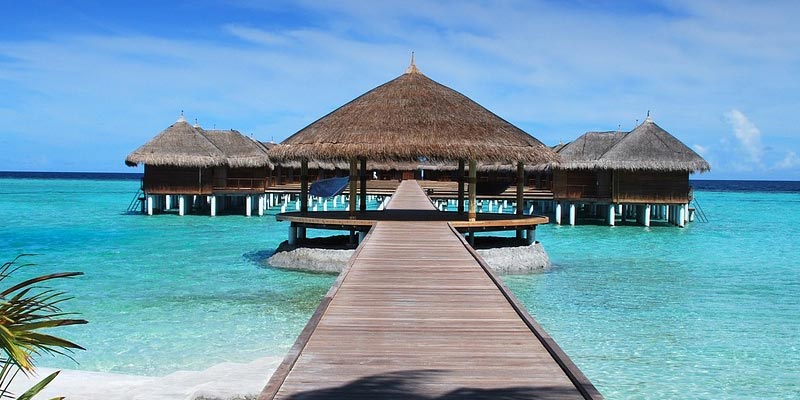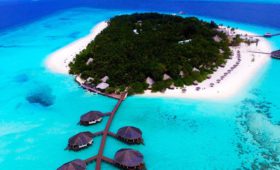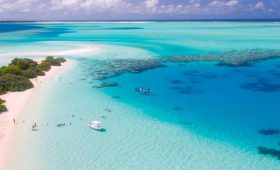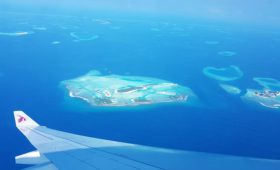Synonymous with luxury, romance, and unparalleled beauty is the Maldives; an archipelago in the Indian Ocean that epitomizes paradise. Its renown stems from its overwater bungalows – turquoise lagoons teeming with life amid vibrant coral reefs is truly a dream destination for many travelers. Yet—this idyllic island nation carries another distinction–notoriety for its steep price tag.
This article dissects the factors underpinning the Maldives’ reputation as a pricey destination.
Why Maldives Is Expensive?
Ultimately, supply and demand dictate the dynamics: a surge in vacationers traveling to Maldives will invariably escalate costs. The escalation results from limited hotel and accommodation provisions on the small islands.
Below are more in-depth details of why Maldives is expensive:
1. Exclusive Accommodations
The Maldives distinguishes itself with its iconic overwater bungalows and private villas, elevated above transparent azure waters; this is indeed a defining feature. These exclusive accommodations—renowned for their unrivaled privacy and direct oceanic access—attract luxury travelers fervently.
However, constructing them comes at a significant cost both in terms of initial investment and ongoing maintenance to ensure unparalleled comfort within these unique lodgings.
2. Remote Location and Limited Accessibility:
Situated in a remote part of the Indian Ocean, The Maldives comprises 26 atolls and over 1,000 coral islands. The country’s geographical isolation necessitates specialized transportation infrastructure, seaplanes, and speedboats specifically – to access its diverse array of islands and resorts; this poses unique logistical challenges.
Consequently, these factors elevate the overall cost associated with travel to as well as within The Maldives.
3. Environmental Conservation
Committing to the preservation of its pristine environment and fragile ecosystems, such as coral reefs and marine life, The Maldives demonstrates an unwavering dedication. Prioritizing sustainability and eco-friendly practices characterize many resorts in The Maldives; they employ methods like desalination for freshwater production along with efficient waste management systems.
Although crucial for environmental conservation, these initiatives frequently incur substantial operational costs, a reflection evident in the total price of a stay.
4. Limited Local Resources
The Maldives, functioning as an island nation, heavily depends on imports for goods and services due to a scarcity of abundant natural resources.
This lack necessitates the importation of essentials such as food, energy, and building materials; all significant contributors to the overall cost of living – subsequently impacting vacation costs.
5. All-Inclusive Packages
All-inclusive packages, encompassing meals, activities, and amenities: these are the offerings of many resorts in the Maldives. These indulgent experiences—hassle-free yet contributing to a perception of high costs—maintain their quality through significant investment required for maintaining high-end dining options; luxurious spa services; and diverse recreational activities in this remote setting.
The prominence of package prices thus reflects this necessary expenditure.
6. Exclusivity and Privacy
Offering an exclusive and intimate atmosphere, perfect for honeymooners, celebrities, and seclusion-seekers is a point of pride for The Maldives. Each resort’s limited number of rooms guarantees privacy and provides personalized service; however—it also restricts availability—particularly concerning more budget-friendly options.
This scarcity contributes significantly to the prevailing perception that travel in The Maldives can be quite exclusive—and correspondingly expensive.
Conclusion
The Maldives, renowned for its luxury and breathtaking beauty, earns its reputation as an expensive destination due to exclusivity; environmental conservation efforts; and limited accessibility – all underpinned by a commitment to providing unparalleled guest experience.
The cost of indulging in a once-in-a-lifetime experience amid pristine landscapes and turquoise waters reflects not only the luxury but also signifies the dedication towards preserving this tropical paradise for future generations: thus maintaining top-tier status among destinations.




